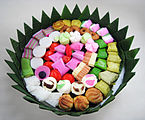 A plate of wingko A plate of wingko | |
| Alternative names | Wingko Babat |
|---|---|
| Type | Pancake |
| Place of origin | Indonesia |
| Region or state | Java and Nationwide in Indonesia, also popular in Southeast Asia |
| Main ingredients | Coconut |
| Nutritional value per 100 g (3.5 oz) | |||||||||||||||||||||||||||
|---|---|---|---|---|---|---|---|---|---|---|---|---|---|---|---|---|---|---|---|---|---|---|---|---|---|---|---|
| Energy | 1,485.3 kJ (355.0 kcal) | ||||||||||||||||||||||||||
| Carbohydrates | 51.4 g | ||||||||||||||||||||||||||
| Dietary fibre | 2.4 g | ||||||||||||||||||||||||||
| Fat | 15.1 g | ||||||||||||||||||||||||||
| Protein | 3.2 g | ||||||||||||||||||||||||||
| |||||||||||||||||||||||||||
| Other constituents | Quantity | ||||||||||||||||||||||||||
| Water | 29.7 g | ||||||||||||||||||||||||||
| Percentages estimated using US recommendations for adults, except for potassium, which is estimated based on expert recommendation from the National Academies. Source: Indonesian Ministry of Health AP113 | |||||||||||||||||||||||||||
Wingko, wiwingka or bibika, which is sometimes called wingko babat, wiwingka or bibika (rev. De voeding in Nederlands-Indië 1904), is a traditional Indonesian pancake-like snack made from coconuts. This kue is usually associated with Javanese cuisine.
Wingko is a type of cake made mainly of coconut and other ingredients. Wingko is popular especially along the north coast of Java island. It is sold mostly by peddlers on trains, at bus or train stations, or in the producer's own shop. This might explain its popularity in Java to as a gift to families upon returning from traveling.
Wingko is typically a round, almost hard coconut cake that is typically served in warm, small pieces. Wingko is sold either in the form of a large, plate-sized cake or small, paper wrapped cakes.
The most famous wingko is made in Babat. As its full name, wingko babat, suggests, wingko actually originated in Babat, a small district in Lamongan regency in East Java, near the border with the regency of Bojonegoro. In Babat, which is only a small town, wingko plays a big role in its economy. There are many wingko factories in that city, employing many workers. The factories receive much coconut fruit from the neighbouring municipalities.
Today wingko is a famous food in both Babat with various brands and sizes of wingko for sale. Most wingko factories are still owned by Indonesian Chinese and some still use Chinese language names for their brands.
See also
- Bibingka - a similar rice cake from the Philippines and eastern Indonesia
- Kue bingka - a similar cake from the Banjar and Malay people of Indonesia
| This article needs additional citations for verification. Please help improve this article by adding citations to reliable sources. Unsourced material may be challenged and removed. Find sources: "Wingko" – news · newspapers · books · scholar · JSTOR (February 2022) (Learn how and when to remove this message) |
References
- United States Food and Drug Administration (2024). "Daily Value on the Nutrition and Supplement Facts Labels". FDA. Archived from the original on 2024-03-27. Retrieved 2024-03-28.
- National Academies of Sciences, Engineering, and Medicine; Health and Medicine Division; Food and Nutrition Board; Committee to Review the Dietary Reference Intakes for Sodium and Potassium (2019). "Chapter 4: Potassium: Dietary Reference Intakes for Adequacy". In Oria, Maria; Harrison, Meghan; Stallings, Virginia A. (eds.). Dietary Reference Intakes for Sodium and Potassium. The National Academies Collection: Reports funded by National Institutes of Health. Washington, DC: National Academies Press (US). pp. 120–121. doi:10.17226/25353. ISBN 978-0-309-48834-1. PMID 30844154. Retrieved 2024-12-05.
- Barongtrans (26 February 2022). "Resep Membuat Wingko Babat Asli". Barongtrans (Indonesia). Retrieved 10 February 2022.
